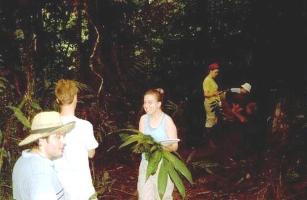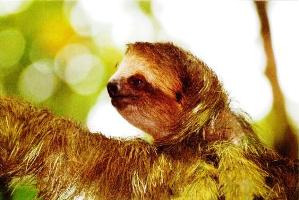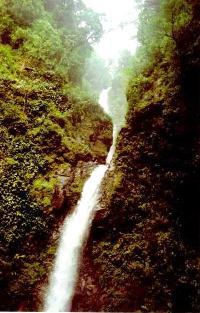

.jpg)
2017 Semester starts June 4 and ends July 17
Students will experience the natural splendor and be exposed to the exciting
culture of Costa Rica in Central America.
The Summer Semester in Costa Rica will provide a superb opportunity for students
to be immersed in a Latin American environment and promises to be a memorable and
unique learning experience.
Course Description
The goal of this program is to provide students an academically vigorous study
opportunity in a Latin American country. The three courses that will make up this
program are:
BIOL 101: Concepts in
Biology: Tropical Field Botany (NS-L).
Dr. Ann Willyard 
This course will introduce students to the plant species and
ecosystems of northwestern Costa Rica during the Summer Semester. We will study
plant morphology, plant taxonomy, evolutionary principles, and ecological
interactions using the New World pre-montane and cloud forests of the San Luis
Field Station as our field sites.
This will be a theme-based course that uses hands-on
exploration to lead our study of how evidence-based science is used to
understand life on earth. Our four big themes will be plant structure,
secondary compounds, photosynthesis, and life as an epiphyte. We will take
advantage of the rich plant diversity at the San Luis Field Station to learn
how to identify native plant species and how they interact with fungi, insects,
birds, and mammals. For example, we will learn what purpose each floral
characteristic provides – does it attract pollinators or protect seeds? A visit
to a local coffee plantation will form the basis for our exploration of
secondary compounds (caffeine in this example) that are desired by humans. Why
do plants manufacture these compounds that are medicinal and/or toxic to
humans? We will visit a local sugar refinery to lead into our study of
photosynthesis. All plants create sugar via photosynthesis – why does this big
grass species (sugar cane) make so much sugar? Many plant species live in the
Costa Rican rainforest as epiphytes (attached to the upper branches of huge
tropical trees) and their roots never reach the soil. How do they get their
nitrogen and phosphorous? How do their seeds get dispersed so that their
offspring can grow attached to another tree branch?
ANTH 235: Peoples and Cultures of Latin America (CW, SB)
Dr. Stacey Schwartzkopf 
An overview of culture and social life in Latin America with some historical context. Topics examined include the legacy of European colonialism, indigenous cultures, and the influence of the contemporary global economy and transnational migration. Both ethnographic representations and hands-on research are used to learn about this diverse and fascinating region.”
HIST 425: Topics in European History: Early Modern Travel Literature (HP pending)
Dr. Sasha Pfau 
This course will examine early modern European travel literature about the New World, considering how they drew their expectations from medieval antecedents and how they either clung to or departed from them when faced with new landscapes and peoples. We will read the journals of Christopher Columbus along with later accounts of Spanish exploration in New Spain. Students will also journal about their own experiences traveling from Arkansas to Costa Rica, and consider the ways that their own preconceptions and expectations are confirmed or challenged by their experiences living abroad. (HP Pending)
Students will choose 2 of the 3 courses.
Accommodations



Students and faculty will live and study at Ecolodge San Luis, a field station
located in north-central Costa Rica. The station is located near the Quaker community
of Monteverde and the famed rainforest preserves of the area. The Ecolodge is part
of the San Luis valley community and is closely involved with the local people in
regulating farming, ecotourism, and development activities. It provides an excellent
opportunity for students to become immersed in a Spanish-speaking culture. Day trips
are possible to other areas of the country including the capital, San Jose, nearby
volcanoes, and the historical site of Santa Rosa. The people occupying the valley
are mostly engaged in farming, growing coffee and sugar, and raising milk cattle
for the local dairy. Some residents supplement their income with ecotourism activities.
The field station and local residents work together to promote development activities
that do not adversely affect life in San Luis. The community living here provides
students with frequent and significant interaction in a Spanish-speaking culture.
Surrounding much of San Luis valley are many natural reserves including the
Monteverde Cloud Forest and the Children’s
Rain Forest which allow for detailed study of tropical environments.
The Program

The semester is open to students at any level and from any discipline and is
coded for Odyssey Global Awareness (GA) and Service to the World (SW) credit.
The Cost
Tuition for the 2017 Summer Semester in Costa Rica is $5,950. Airfare is additional.
- Deposit of $800 will be due about January 22, 2017 and should be paid
at the business office.
- Balance of course fees will be due about March 1, 2017, and should also be paid at the business office.
- Air fare is (pending).
Program charges include:
*all transportation, all meals and lodging in Costa Rica,
*health & travel insurance, and field trips to national parks and places of
cultural interest
Personal spending money is the responsibility of the student.
Homestays are available with local families, at an additional cost of $15.00 per
night.
Applications
Applications should be submitted to the
Office of International Programs at
http://www.hendrix.edu/internationalprograms/
The date when applications for 2017 are due will be announced as soon as determined.
Course Schedule
Sunday, TBA Flight to San Jose, transfer to San Luis
Friday, TBA Flight home
All Hendrix policies regarding student conduct apply during the Summer Semester
in Costa Rica.
Contact:
Dr. Matthew D. Moran
moran@hendrix.edu
D W Reynolds Center for Life Science
Room 215
(501) 450-3814
Fax: (501) 450-4547